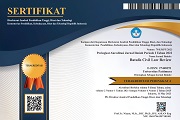The Essence of the Prohibition of Tender Rigging from a Business Competition Law Perspective
 ), Lucianus Budi Kagramanto(2), Endang Prasetyawati(3), Krisnadi Nasution(4)
), Lucianus Budi Kagramanto(2), Endang Prasetyawati(3), Krisnadi Nasution(4)
(1) Faculty of Law, Universitas 17 Agustus 1945 Surabaya, Surabaya, Indonesia
(2) Faculty of Law, Universitas 17 Agustus 1945 Surabaya, Surabaya, Indonesia
(3) Faculty of Law, Universitas 17 Agustus 1945 Surabaya, Surabaya, Indonesia
(4) Faculty of Law, Universitas 17 Agustus 1945 Surabaya, Surabaya, Indonesia
 Corresponding Author
Corresponding Author
Abstract
Introduction: The government has made efforts to ensure that existing business competition legal regulations can accommodate the broad legal needs of society, but in reality, in everyday life, legal problems are still often encountered. One of the fundamental legal issues related to business competition in Indonesia is regarding government procurement of goods/services. There are many practices of bid rigging in the process of procuring government goods/services to determine the winner in a tender. Tender conspiracy cases often occur in Indonesia, therefore everything related to tender conspiracy must be carefully scrutinized.
Purposes of the Research: The aim of this research is to analyze and discover the nature of the prohibition on bid rigging from a business competition law perspective.
Methods of the Research: The research method used is normative juridical. Descriptive and argumentative techniques must be used in carrying out the analysis.
Results of the Research: The essence of the prohibition on bid rigging from a business competition law perspective can actually be observed in Article 22 of Law no. 5/1999, Per. KPPU No. 2/2010, and Constitutional Court Decision Number 85/PUU-XIV/2016. This prohibition aims to not give rise to unhealthy business competition, so that the aim of holding tenders can be achieved properly to provide equal opportunities to business actors in offering competitive prices and quality, which in the end will result in the lowest price with the best quality.Keywords
DOI
10.47268/ballrev.v5i3.2093
Published
2024-11-29
How To Cite
@article{BALLREV2093,
author = {Dave Tedjokusumo and Lucianus Kagramanto and Endang Prasetyawati and Krisnadi Nasution},
title = {The Essence of the Prohibition of Tender Rigging from a Business Competition Law Perspective},
journal = {Batulis Civil Law Review},
volume = {5},
number = {3},
year = {2024},
keywords = {Essence; Tender Rigging; Business Competition Law.},
abstract = {Introduction: The government has made efforts to ensure that existing business competition legal regulations can accommodate the broad legal needs of society, but in reality, in everyday life, legal problems are still often encountered. One of the fundamental legal issues related to business competition in Indonesia is regarding government procurement of goods/services. There are many practices of bid rigging in the process of procuring government goods/services to determine the winner in a tender. Tender conspiracy cases often occur in Indonesia, therefore everything related to tender conspiracy must be carefully scrutinized. Purposes of the Research: The aim of this research is to analyze and discover the nature of the prohibition on bid rigging from a business competition law perspective.Methods of the Research: The research method used is normative juridical. Descriptive and argumentative techniques must be used in carrying out the analysis.Results of the Research: The essence of the prohibition on bid rigging from a business competition law perspective can actually be observed in Article 22 of Law no. 5/1999, Per. KPPU No. 2/2010, and Constitutional Court Decision Number 85/PUU-XIV/2016. This prohibition aims to not give rise to unhealthy business competition, so that the aim of holding tenders can be achieved properly to provide equal opportunities to business actors in offering competitive prices and quality, which in the end will result in the lowest price with the best quality.},
issn = {2746-8151}, pages = {146--155} doi = {10.47268/ballrev.v5i3.2093},
url = {https://fhukum.unpatti.ac.id/jurnal/ballrev/article/view/2093}
}
Journal Article
Antoni, Veri. "Law Enforcement in Cartel Cases Outside of Tender Rigging in Indonesia." Pulpit Law - Faculty of Law, Gadjah Mada University 31, no. 1 (2019): 96. https://doi.org/10.22146/jmh.37966.
Asmah, Asmah. "Implementation of Fine Sanctions in National Road Tender Conspiracy Cases." Judicial Journal 12, no. 2 (September 2019): 198. https://doi.org/10.29123/jy.v12i2.280.
Bakti, Surya, and Zainal Asikin. "The Existence of the Business Competition Supervisory Commission in Handling Tender Rigging from a Positive Indonesian Legal Perspective" 3, no. 2 (2020): 261. https://doi.org/10.31869/plj.v3i2.1953.
Febrina, Rezmia. "Business Competition in the Digital Era According to a Business Competition Law Perspective." Journal of Multidisciplinary Scientific Work (JURKIM) 2, no. 1 (2022): 121. https://doi.org/10.31849/jurkim.v2i1.9309.
Maheswari, Alya Anindita. "Limitations, Authority and Involvement of the KPPU in Tender Rigging Cases According to Business Competition Law." Jurist-Diction 3, no. 5 (2020): 1581. https://doi.org/10.20473/jd.v3i5.21967.
Pane, Moses Darwin. "Legal Aspects of Procurement of Government Goods and Services, a Juridical Review of Regulations for Procurement of Government Goods and Services." Legal Media Journal 24, no. 2 (2017): 148. https://doi.org/10.18196/jmh.2017.0090.147-155.
Prasetya, Hendi Indra, and Danang Wahyu Muhammad. "Evidence in Settlement of Tender Conspiracy Cases." Media of Law and Sharia 3, no. 1 (2022): 21. https://doi.org/10.18196/mls.v3i1.13223.
Sirait, Resmaya Agnesia Mutiara. "Prohibition of Conspiratorial Actions in Tenders Based on Law Number 5 of 1999 concerning Prohibition of Monopoly Practices and Unfair Business Competition." Tanjungpura Law Journal 4, no. 2 (2020): 181. https://doi.org/10.26418/tlj.v4i2.33980.
Book
Ibrahim, Johnny. Business Competition Law (Philosophy, Theory, and Implications of Its Application in Indonesia). Malang: Bayu Media, 2006.
Rokan, Mutafa Kamal. Business Competition Law (Theory and Practice in Indonesia). Jakarta: Raja Grafindo Persada, 2010.
Suhasril and Mohammad Taufik Makarao. Law Prohibiting Monopoly Practices and Unfair Business Competition in Indonesia. Bogor: Ghalia Indonesia, 2010.| Dublin Core | PKP Metadata Items | Metadata for this Document | |
| 1. | Title | Title of document | The Essence of the Prohibition of Tender Rigging from a Business Competition Law Perspective |
| 2. | Creator | Author's name, affiliation, country | Dave David Tedjokusumo; Faculty of Law, Universitas 17 Agustus 1945 Surabaya, Surabaya; Indonesia |
| 2. | Creator | Author's name, affiliation, country | Lucianus Budi Kagramanto; Faculty of Law, Universitas 17 Agustus 1945 Surabaya, Surabaya; Indonesia |
| 2. | Creator | Author's name, affiliation, country | Endang Prasetyawati; Faculty of Law, Universitas 17 Agustus 1945 Surabaya, Surabaya; Indonesia |
| 2. | Creator | Author's name, affiliation, country | Krisnadi Nasution; Faculty of Law, Universitas 17 Agustus 1945 Surabaya, Surabaya; Indonesia |
| 3. | Subject | Discipline(s) | |
| 3. | Subject | Keyword(s) | Essence; Tender Rigging; Business Competition Law. |
| 4. | Description | Abstract | Introduction: The government has made efforts to ensure that existing business competition legal regulations can accommodate the broad legal needs of society, but in reality, in everyday life, legal problems are still often encountered. One of the fundamental legal issues related to business competition in Indonesia is regarding government procurement of goods/services. There are many practices of bid rigging in the process of procuring government goods/services to determine the winner in a tender. Tender conspiracy cases often occur in Indonesia, therefore everything related to tender conspiracy must be carefully scrutinized. Purposes of the Research: The aim of this research is to analyze and discover the nature of the prohibition on bid rigging from a business competition law perspective.Methods of the Research: The research method used is normative juridical. Descriptive and argumentative techniques must be used in carrying out the analysis.Results of the Research: The essence of the prohibition on bid rigging from a business competition law perspective can actually be observed in Article 22 of Law no. 5/1999, Per. KPPU No. 2/2010, and Constitutional Court Decision Number 85/PUU-XIV/2016. This prohibition aims to not give rise to unhealthy business competition, so that the aim of holding tenders can be achieved properly to provide equal opportunities to business actors in offering competitive prices and quality, which in the end will result in the lowest price with the best quality. |
| 5. | Publisher | Organizing agency, location | Faculty of Law, Universitas Pattimura |
| 6. | Contributor | Sponsor(s) | |
| 7. | Date | (YYYY-MM-DD) | 2024-11-29 |
| 8. | Type | Status & genre | Peer-reviewed Article |
| 8. | Type | Type | |
| 9. | Format | File format | |
| 10. | Identifier | Uniform Resource Identifier | https://fhukum.unpatti.ac.id/jurnal/ballrev/article/view/2093 |
| 10. | Identifier | Digital Object Identifier | 10.47268/ballrev.v5i3.2093 |
| 11. | Source | Title; vol., no. (year) | Batulis Civil Law Review; Vol 5, No 3 (2024): VOLUME 5 ISSUE 3, NOVEMBER 2024 |
| 12. | Language | English=en | en |
| 13. | Relation | Supp. Files | |
| 14. | Coverage | Geo-spatial location, chronological period, research sample (gender, age, etc.) | |
| 15. | Rights | Copyright and permissions | Copyright: Authors who publish their manuscripts in this Journal agree to the following conditions: 1. The copyright in each article belongs to the author, as well as the right to patent. 2. Authors are able to enter into separate, additional contractual arrangements for the non-exclusive distribution of the journal's published version of the work (e.g., post it to an institutional repository or publish it in a book), with an acknowledgment of its initial publication in this journal. 3. Authors are permitted and encouraged to post their work online (e.g., in institutional repositories or on their website) prior to and during the submission process, as it can lead to productive exchanges, as well as earlier and greater citation of published work. 4. Authors have the right to self-archiving of the article (Author Self-Archiving Policy)
Licence : Batulis Civil Law Review Journal is disseminated based on the Creative Commons Attribution-NonCommercial 4.0 International license terms. This license allows anyone to copy and redistribute this material in any form or format, compose, modify, and make derivatives of this material for any purpose. You cannot use this material for commercial purposes. You must specify an appropriate name, include a link to the license, and certify that any changes have been made. You can do this in a way that is appropriate, but does not imply that the licensor supports you or your use.
|
Copyright (c) 2024 Dave David Tedjokusumo, Lucianus Budi Kagramanto, Endang Prasetyawati, Krisnadi Nasution
License URL: https://creativecommons.org/licenses/by-nc/4.0

 : 1889 times
: 1889 times Download : 810 times
Download : 810 times















